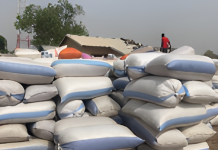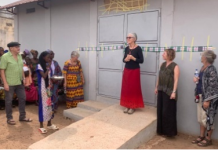Abdoulai G. Dibba
The United Nations Food and Agriculture Organisation (FAO) and Ministry of Agriculture (MOA) have on Tuesday, 2 August  2016, signed an agreement on Integrated Pest Management on the Whitefly at a ceremony held at the ministry in Banjul.
2016, signed an agreement on Integrated Pest Management on the Whitefly at a ceremony held at the ministry in Banjul.
In her statement, Dr Perpetua Katepa Kalala, the FAO Country Representative, said the Technical Cooperation Programme (TCP) they are signing represents a contribution from FAO of 20.4 million Dalasi and that the project, which has the duration of 18 months, was designed by the Plant Protection Services (PPS) of the ministry of agriculture with technical support from FAO.
The FAO Country Rep said the whitefly which originated from Central America and the Caribbean is now widespread in West Africa and is devastating fruit trees, vegetables and ornamental plants in The Gambia, resulting in economic loss to farmers and communities and threatening the food security of the country.
Dr Kalala noted that the whitefly is a tiny moth-like insect just 1-2 mm in size that sucks plant sap producing black sooty on the plant and causes infection of the plant with viral, bacterial and fungal diseases. “Infested plants are stunted and unproductive resulting in death of the plant,” she added.
She disclosed that the magnitude of crop loss and destruction to landscape and ornamental plants as a result of whitefly infestation mostly in the West Coast and North Bank Regions is of great economic significance.
More important, she added, is the fact that there is also high risk of the insect pest spreading to new locations in The Gambia and to neighbouring countries if preventive measures are not swiftly put in place.
In conclusion, Dr. Kalala said during the implementation of the project, the Plant Protection Services will have at its disposal a pool of experts with ample professional experience ready to provide hands-on technical support and to enhance the technical capacity of the Plant Protection Service, adding that she will take the opportunity to reaffirm FAO’s commitment to deepen its collaboration and technical cooperation with the ministry of agriculture.
“We are obliged to converge here today to demystify the presence of the notorious alien insect pests, the white flies, in The Gambia. These aliens do not request for any visa to enter nor any permit to reside in any country. They have, more than a decade ago, occupied this country and, currently they are found in every part of this land. Consequently, it is quite obvious and explicit that the spiraling white flies have presently the status of obligatory natives of this country, but unwanted in every respect,” said Sheriffo Bojang, the Deputy Minister of Agriculture, on behalf of the minister,
Mr. Bojang said many fruits, shade and ornamental plants have been devastated by them and that many vegetables have also been destroyed by them.
The agriculture minister noted that the agricultural sector continues to be under a serious economic threat by these pests and that losses of up to 100% has been realized in some fruit plants like pawpaw and that more other plants have suffered a decrease in yield due to the direct and indirect negative impacts of these pests.
“Numerous ornamental plants at the hotel industry and some residences have lost their value because of the occurrence of them,” he said.
For this reason, he added, the ministry of agriculture is exceedingly happy and grateful to sign this TCP on Integrated Pest Management on Whitefly which, when implemented, is expected to solve the menace of whitefly pests in The Gambia.
“We, at the ministry of agriculture, wish to earnestly assure a continuous collaboration with FAO in supporting the Government to meet its development agenda or goals,” concluded Mr. Bojang.
The signing ceremony was attended by officials from both the FAO and ministry of agriculture, including the Director of Agriculture, Falalo Touray, who also lauded the initiative.




















